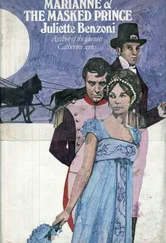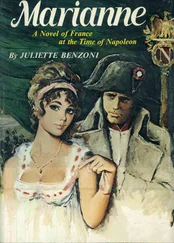Жюльетта Бенцони - Marianne and the Lords of the East
Здесь есть возможность читать онлайн «Жюльетта Бенцони - Marianne and the Lords of the East» весь текст электронной книги совершенно бесплатно (целиком полную версию без сокращений). В некоторых случаях можно слушать аудио, скачать через торрент в формате fb2 и присутствует краткое содержание. Жанр: Исторические любовные романы, на английском языке. Описание произведения, (предисловие) а так же отзывы посетителей доступны на портале библиотеки ЛибКат.
- Название:Marianne and the Lords of the East
- Автор:
- Жанр:
- Год:неизвестен
- ISBN:нет данных
- Рейтинг книги:3 / 5. Голосов: 1
-
Избранное:Добавить в избранное
- Отзывы:
-
Ваша оценка:
- 60
- 1
- 2
- 3
- 4
- 5
Marianne and the Lords of the East: краткое содержание, описание и аннотация
Предлагаем к чтению аннотацию, описание, краткое содержание или предисловие (зависит от того, что написал сам автор книги «Marianne and the Lords of the East»). Если вы не нашли необходимую информацию о книге — напишите в комментариях, мы постараемся отыскать её.
Marianne and the Lords of the East — читать онлайн бесплатно полную книгу (весь текст) целиком
Ниже представлен текст книги, разбитый по страницам. Система сохранения места последней прочитанной страницы, позволяет с удобством читать онлайн бесплатно книгу «Marianne and the Lords of the East», без необходимости каждый раз заново искать на чём Вы остановились. Поставьте закладку, и сможете в любой момент перейти на страницу, на которой закончили чтение.
Интервал:
Закладка:
That form, with its voluptuous curves, recalled to her another daughter of those distant islands, Fortunée Hamelin. It was so obviously made for love, a perfect instrument designed to bend and vibrate to the fierce tempest of sensual passion which it had never truly known. Nor had the single pregnancy left the slightest trace. This beauty had the pointless, lonely splendor of a museum piece.
A feeling of profound pity swept over Marianne as Nakshidil emerged, as excited as a small girl, from the shimmering folds of the sea-green dress and let its heavy folds drape themselves about her. The dress was too long, its rightful owner being somewhat the taller of the two, but apart from that it fitted perfectly, so perfectly indeed that the sultana clapped her hands delightedly.
"Oh," she cried, "how I should love to own this dress!"
Marianne had a mental vision of herself returning to the embassy in her petticoat, since there was really nothing she could do but make a present of the dress. But, equal to anything that might help to save her mission and install her firmly in the sultana's good graces, she did not hesitate, but spoke up cheerfully: "If Your Highness will lend me a cloak or something so that I may not shock people when I go back to the embassy, I shall be happy to present you with the dress since you like it so much."
The blue eyes sparkled and gazed eagerly at Marianne.
"You would give me your dress?" Nakshidil said. "Even though we do not resume our former relations with Napoleon?"
Marianne controlled herself sufficiently to give no sign. Her smile lost none of its warmth or sweetness and she managed to sustain a dignity and unconcern which came none too easily when dressed only in one's petticoat.
"Friendship is one thing," she said quietly, "and politics are quite another, very different as it seems to me. This is a gift from the heart—and I am only conscious of how unworthy it is. I wish I had something more precious to offer to Your Highness in token of my gratitude—"
The sultana's laugh held real amusement.
"I begin to think your emperor would be well advised to put you in Latour-Maubourg's place! You're a much better diplomat than he is—"
Then, picking up the skirts that were too long for her, she went to her visitor and hugged her with true Creole warmth.
Still with her arms around her, she went on with sudden seriousness: "I can do nothing for your emperor, my child. Believe me, it is not from ill will. I don't even bear him any grudge over Rose's divorce or that notorious letter. There are such things as political necessities, I know that, and, as you say, these have nothing to do with human feelings. Those who serve them must forget that they have hearts—and sometimes consciences also. But things are going very badly for us on the Danube. My son, the sultan, yearns for a well-trained, modern army, but he has to meet the Russians with an undisciplined horde which, though gallant, is eaten with corruption. Its fighting methods are medieval and it is dominated by the janissaries, with their outdated ideas and vendettas. No wonder it suffers heavy losses. Our grand vizier is shut up in Rustchuk asking for assistance and calling for an armistice—"
"You would consider—making peace?" Marianne gasped with a sudden pang.
"Short of a miracle—and I don't believe in miracles when dealing with an empire that would gladly rob us of the Dardanelles—we shall have to make peace before the winter is out. Khaled, the grand vizier, makes no secret of his desire to treat with Kutuzov because he is under continual attack by Ataman Platov's cossacks and running short of men."
"But you must hold out, Your Highness!" Marianne implored her. "The emperor does not ask for your continued resistance without reason. Very soon now—"
"Nearly a year—"
"Sooner, perhaps. I can tell you that Marshal Davoust and your cousin, Prince Eugene, are gathering an immense army in Germany. If you can only hold out, the tsar will soon be forced to relieve you of Kutuzov. Your war is lost now, but Napoleon can turn the tables for you and give you victory—and the Danube principalities."
Nakshidil, who had continued to hold Marianne within the warm circle of her arms, let her go and shrugged. The sadness of her smile was tinged with irony.
"Don't try to make me believe, Princess, that Napoleon is about to attack Alexander purely for the sake of helping us. I've told you, we ceased to have any illusions regarding his intentions toward us a long time ago. If he wants us to go on holding out there is one thing he can do—send us troops, a few regiments out of that immense army of his. Then perhaps the grand vizier might hold out, with more than the fifteen thousand men he has at present! Otherwise, it's impossible."
"Will Mr. Canning bring you any better help?"
"Not in a military sense, no. But diplomatically, yes. When it comes to negotiating the peace, he is pledged to help us and to obtain the best possible terms from the tsar."
"Oh, Your Highness," Marianne said reproachfully, "has the sultan so far forgotten his mother's country? Have you yourself forgotten it?"
"I have forgotten nothing," Nakshidil said with a sigh. "Unfortunately, my son has been taught to look on his mother's country with some distrust. Do you think Mahmoud can forget that one of his greatest enemies is French?"
"French? Who is that?"
"The governor of Odessa. For years now, that man has been building up a powerful city on the shores of the Black Sea, and, more important, a harbor for the ships that come out to attack us at the very mouth of the Bosporus. I am speaking of the Duc de Richelieu, the tsar's friend and more Russian than the Russians. Napoleon had better reckon with that irreconcilable émigré because he has the Tatar hordes at his beck."
"But as Your Highness says, he is an émigré, one of the emperor's own enemies!"
"A Frenchman nonetheless. And that, in my son's eyes, is all that matters. You cannot ask him to let his people die to help a selfish ruler who never thinks of us unless he needs us."
There was a silence in which Marianne saw the success of her mission slowly foundering. She had too much honesty not to understand the sultan's reasons and those of his mother, for they were sound and respectable. Moreover, she had learned long ago to her cost to measure the depths of Napoleon's egoism. As Nakshidil had said, short of a miracle the Turks would soon be seeking an armistice, and this was something that Paris must know as soon as possible.
Aware that it would be clumsy, even ill mannered to persist after the kindness already shown her, Marianne abandoned the argument, for that night at least. She would have to report to the accredited ambassador but just now she felt very tired.
"If I might ask Your Highness's permission to retire," she murmured.
"But of course! But not like that!"
All the sultana's gaiety had returned and she was issuing a fresh stream of orders. In another moment Marianne found herself transformed into an Ottoman princess—by virtue of a gorgeous yellow robe, thickly embroidered with gold, to which the sultana, with princely generosity, had added a girdle, necklace and earrings set with rubies and pearls—and was sinking, not without difficulty, into her farewell curtsy, watched by the Kizlar Aga and the court ladies who had miraculously reappeared.
"We shall meet again very soon," Nakshidil assured her with an encouraging smile as she offered Marianne her hand to kiss. "And don't forget, you will be expected tomorrow night at the place I told you of. For the rest—trust me. I do not think you will be disappointed."
Without elaborating further on these last words, which Marianne could not help feeling were a trifle enigmatic, the Sultan Valideh vanished into the recesses of the pavilion with her ladies following in a cloud of blue, leaving her visitor to be escorted slowly back to her litter by the tall Black Eunuch.
Читать дальшеИнтервал:
Закладка:
Похожие книги на «Marianne and the Lords of the East»
Представляем Вашему вниманию похожие книги на «Marianne and the Lords of the East» списком для выбора. Мы отобрали схожую по названию и смыслу литературу в надежде предоставить читателям больше вариантов отыскать новые, интересные, ещё непрочитанные произведения.
Обсуждение, отзывы о книге «Marianne and the Lords of the East» и просто собственные мнения читателей. Оставьте ваши комментарии, напишите, что Вы думаете о произведении, его смысле или главных героях. Укажите что конкретно понравилось, а что нет, и почему Вы так считаете.











